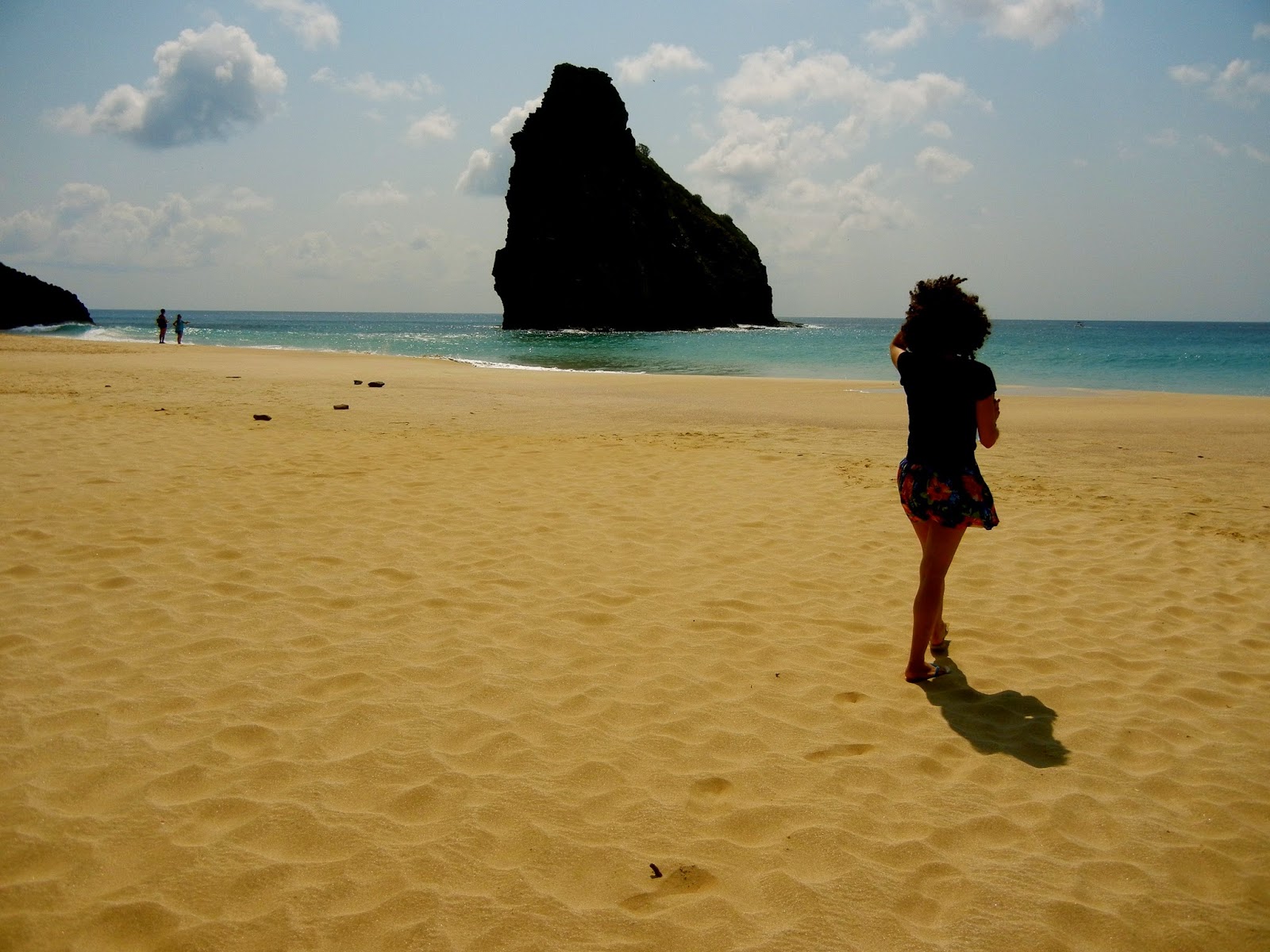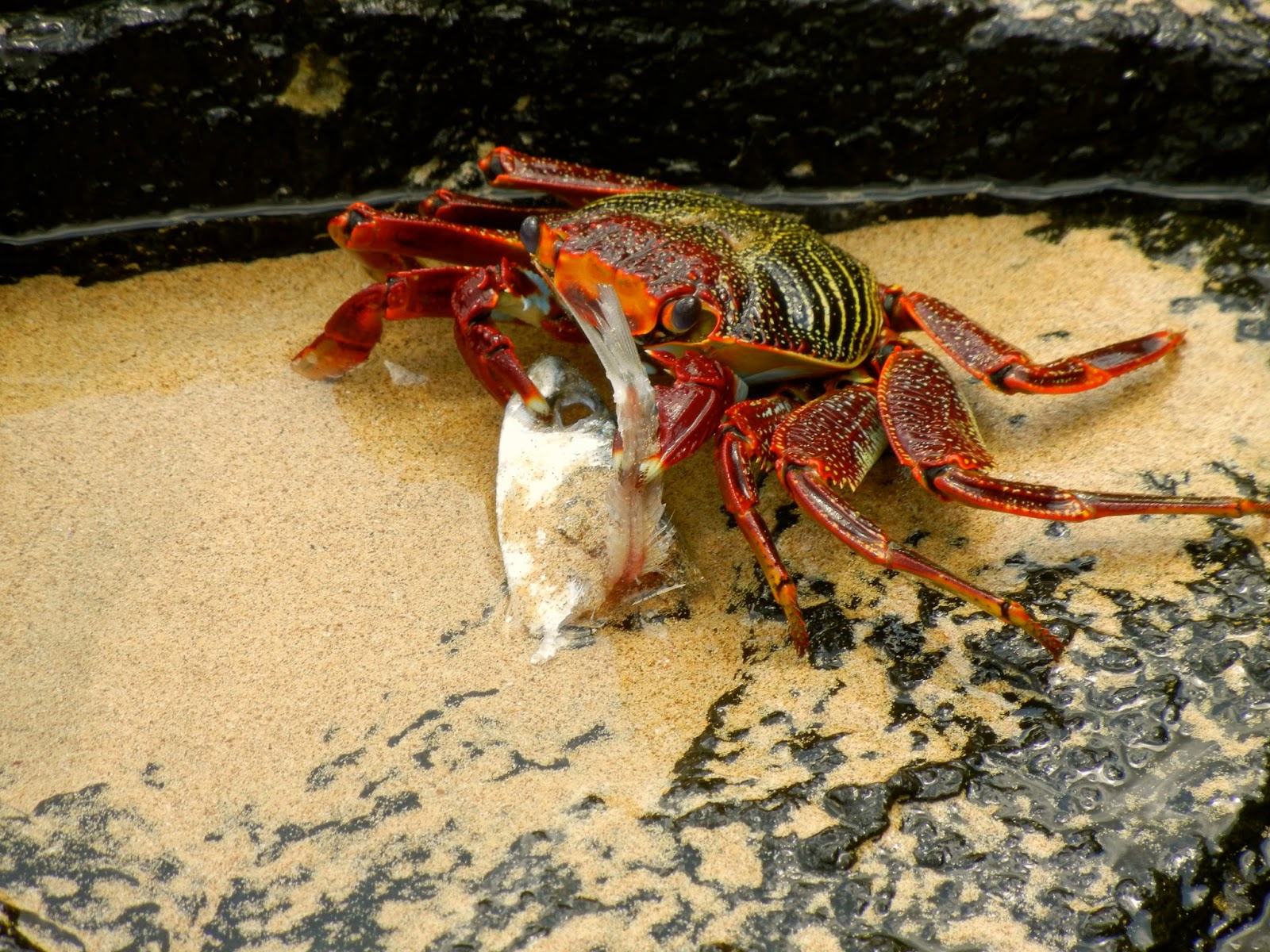Noronha is pricey to get to from Brazil. From other countries it's breathtakingly expensive. Flights are only offered from two coastal cities and tickets are easily twice as much as what a 70 minute flight should be.
Once you land, the first order of business is to pay taxes. Because Noronha is such a guarded environmental jewel, humans to have to pay R $40 (US $18) per day as a penalty for being human. There's also the card you have to buy to access some of the select beaches. And, of course, you're on an island, so everything from a bottle of water to a room will run you two or three times what it would on the mainland.
The island will pick you up and shake you by the heels, but it's well worth it. Dani recommended Noronha for our honeymoon and after one Google search, I was hooked. If we were ever going to go, this would be the time. I'm mighty glad we did.
To get to Noronha, you have to fly through the cities of Natal or Recife. Since we had never been to either, we decided to stop and stay a couple of nights (the price issue of Noronha may have also played a role in this decision). We chose Recife because a friend of ours works at a great hotel there.
Recife has to be one of the sadder stories in Brazil today. A gorgeous beachfront city, it's impossible to look up at its high rise hotels lining the water and not think of Miami. Look down from those towers into the surf and Recife takes on an eerie quality. No one is in the water. No one on the beach either. For miles, Recife's platinum sand is an urban ghost town.
It is South Beach meets Detroit.
The problem is that in the early 90s a large seaport was built a few miles down the coast. When shipping traffic picked up, thousands of sharks that called the area home were disrupted. They migrated to the shallow waters edging Recife.
Shark attack numbers spiked. Surfing was outlawed shortly after. Signs were planted in the sand warning the dangers of swimming. Word spread.
In our two days of sunny, warm weather, we saw exactly no swimmers in Recife.
Problems, as you can guess, multiplied from there. When Dani and I stepped out on the beach around sunset to go for a walk and take a picture with the Shark Attack sign, we had to put the camera away because a drug deal was happening behind it. Drug dealing and usage is common on the beach precisely because it's so empty. After a short walk at dusk, Dani and I decided it better we return to the room.
One of many Shark Attack warnings. Our second attempt at a photo.
The next day, less than 90 minutes away, Dani and I stepped off our plane onto the pavement of Noronha's airstrip. We might as well have been on a different planet. The compact island's beauty is strange and immediate. Chunks of igneous rock formations jutted into the sky around us. One of the island's 10,000 photo ops presented itself before we even stepped inside the airport.
Welcome to Fernando de Noronha. There were so few staff at the airport, I'm pretty sure I could have run onto the runway if I wanted.
It's the strangest place I've ever been. Because the government is so conscious of preserving Noronha, the island limits the number of tourists that can be on it at any one time (I think up to 400). The place has only two or three paved roads. Very few cars. The preferred method of transportation is dune buggy.
Dani on the back of a dune buggy taxi. When this guy hit the throttle on the main road, nothing about it felt safe. We loved it.
No McDonald's. No Starbucks. No luxury resorts or five-star restaurants. No stoplights. No crowds. No traffic. Dirt and gravel roads. Roosters wandering around front yards. Water tanks on roofs.
Fernando de Noronha has positioned itself to continuously appear as if it was discovered in the last two years. Everywhere is quiet. There's no waiting for a restaurant table or an ice cream cone. There's a constant feeling of having the place to yourself. It's hard to tell if Noronhans thrive on tourism or despise it.
The beaches, of which there are ten or so, are all peaceful. Most of the time, Dani and I found ourselves to be the only ones in sight for hundreds of yards in either direction. Cliffs cradled us from behind. Pure, undisturbed sand padded our feet. Towering crags of rock studded the water in front of us.
It's easy to feel like you've got the place to yourself.
Noronha showed itself from the get go to be the place that every middle age woman is imagining when she says she likes long walks on the beach. It's where James Bond takes his girl before her untimely death midway through the film. It will always be the image I think of when I hear the word honeymoon. It was built by God for honeymoons. Dani and I are forever ruined.
Sancho Beach. Trip Advisor's choice as Best Beach in the World.
On our first day, we headed out for Sancho Beach, which was just voted by Trip Advisor as the Best Beach in the World (for my money, I wouldn't put it in the top three on the island, but anyway...).
Like all places worth going, Sancho is not easy to get to. We took a cab down a bumpy dirt road, followed by a ten minute walk through the woods. We then found ourselves at the edge of a cliff that we had to descend down into via two dicey looking ladders and some unkempt stone staircases.
We almost turned away in fear, but this is Fernando de Noronha. Where else are you gonna go?
Sancho Beach will make you work for it.
A few minutes later, after a lot of "Take your time, sweetie"-s, our feet touched down into sand. We were on the Best Beach in the World. There were maybe 20 of us there.
The emerald waters of Sancho.
Sancho Beach and the rest of Noronha boasts world-class diving. While we didn't gear up, we did get a good feel for the wildlife.
Standing in calm, waist-deep water, schools of tropical fish swirled around us. One medium-sized blue and yellow striped fish paid particular attention to us. Dani and I tiptoed closer to him hoping we wouldn't scare him away. Instead, he moved closer to us. The fish circled around us a few times, staring at our legs blankly. When we sloshed away towards the shore, he followed, as if to say, "What? You're leaving already?"
Same thing with a big booby-looking bird I saw land in the middle of a group of tourists and eat a tiny fish right out of someone's hand. Once he realized they were only taking pictures and not supplying anymore treats, he waddled across the sand up to us. I stood there looking down at him as he stared right back at me. He was maybe eight inches away. Both of us just passing the afternoon.
Many of the island's rocks are covered in crabs. This is terrifying at first, but after a little while you realize that, unlike the fish or birds, they want nothing to do with humans. Their sole purpose is to pinch tiny fish from the waves that wash over them. We saw a few strike it big.
Jackpot.
There were also the countless lizards we encountered combing the rocks, the dolphins popping their heads up out on the horizon, and then there was this curious little cliff dweller.
Island squirrel.
There are basically no hotels on the island. Most lodging is in the form of "pousadas," which is their version of a bed and breakfast.
This was the worst part of the trip. All Dani and I wanted out of our room was a place to get some sleep. That was nearly an impossibility for three reasons:
1. Our air conditioner only worked for a few minutes at a time before emitting this high-pitched frequency sound like an alien trying to escape from inside it. Noronha was 85 degrees every day and 77 degrees every night. The humidity was like a blanket. I'm used to living with no A/C, but this was a new ballgame. We sweated and shivered each night.
2. Roosters. There were like a dozen of them surrounding our pousada. Every morning, two of them would go off, back and forth, every ten seconds from 4:00 am to 7:00 am.
3. And this one is almost too funny to be true. Like, if this was a writer's room for a sitcom episode about a bad place to stay and someone pitched this, I would say the audience won't believe it...Somewhere else in our pousada, someone in another room was learning to play the trumpet.
Horrible. Just horrible. Two or three notes at a time that sounded as clear and lovely as a pubescent boy belting out an aria. One particular morning, little Miles Davis broke that bad boy out at 8:30, just after the roosters finished their shift. Unreal.
It didn't help that Dani's skin broke out in a rash just after arriving. As it crawled up her chest and neck towards her face, we decided to go to the local hospital. She got an IV of cortisol and a pill to take. It cleared right up.
Funny enough, Dani's hospital visit was the only free thing on the trip.
Every morning I was miserable. I trudged down our dirt street after breakfast, sleepy-eyed, heavy headed, Dani beside me trying to cheer me up. I was always ready to come home.
Then a few minutes later, our feet hit sand and I looked around at another spectacular beach setting, this one somehow even more beautiful than the day before. And part of me didn't ever want to leave.
I put my arm around Dani and we walked out across the sand to whatever spot we wanted. Barely anyone else in sight. All of nature's truest wonders on private display for us. The three of us there, alone.



















No comments:
Post a Comment